Testimonies of the Armenian Genocide Survivors (Part 2)
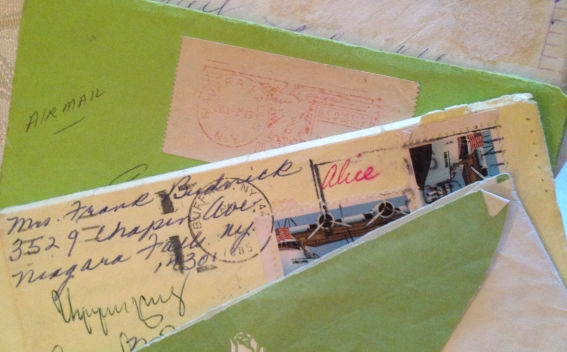
"Armedia" Information, Analytical Agency introduces true stories collected by joint efforts of "European Integration" Non-Governmental Organization and "Armedia" IAA with the support of the Foreign and Commonwealth Office of the
The project aims at contributing to the development of dialogue and trust-building between the Armenian and Turkish societies.
The stories have also been published in the form of a book called "100 Years…True Stories" and are available in Armenian, English and Turkish.
"A Fragment from My Grandmother’s Nostalgia Remained in Us"
Tells Anahit Ghazaryan
My Grandmother Srbuhý was born in 1906 in the village of Alyur, Van situated on the eastern shore of Lake Van. My Grandfather Mampré was born in the same village. Their destinies were decided since early childhood: their parents had made "bashikyartma" [a tradition when children were pre-engaged by their parents at young age, tr.]. I don’t know much about my Grandfather Mampré: he didn’t like to talk. Every time my Grandmother began talking about the Genocide he would smoke and sigh deeply. I have more information about my Grandmother Srbuhý. She would often tell as if she couldn’t find relief. She felt endless nostalgia for her native village and kept repeating until the end of her life, "Some day I will go to my Father’s house."
On the eve of those events Alyur village was living its routine life. A Turkish acquaintance of her Father’s, Grandfather Margar’s, visited them to warn about the anticipated attack. At that moment my Grandmother, her unmarried aunt Noyemzar and her mother Yengibar were at home. When that Turkish friend saw my Grandfather wasn’t at home, offered them to stay in his house. They went and hid for some time but the neighbors noticed there were Armenians in that house, which meant danger for the host. They had to leave that house. This coincided with the moment when awful massacres started in Alyur village. By the way, Alyur was considered the largest village in the district with most Armenian population and had two Armenian churches and a co-educational college. However, the village was burnt to ashes by dawn. Men who had managed to run away survived; others were slaughtered, burnt, killed… Women and children were dragged into the church, the doors were locked. They remained in the church for forty days without food and water. On the forty first day the doors were opened. Most of the captives had died of hunger. Those alive were made to take the road of exile. Passing by Lake Van two women crossed themselves and jumped from the rock…
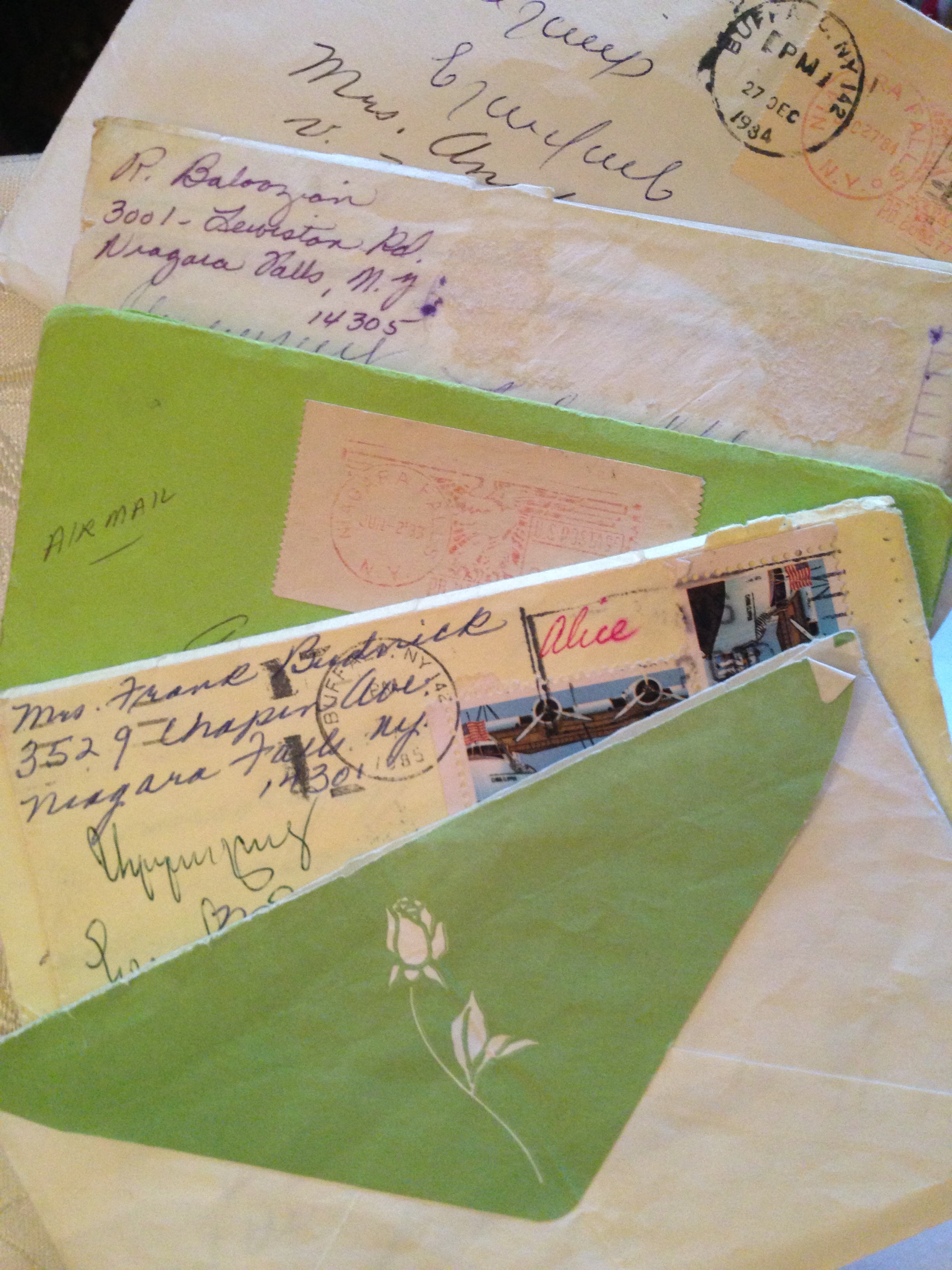 The group of refugees was taken to Salmast. Here they stayed in tents for some time. On the way of exile, before getting to Salmast my Grandmother’s mother was unable to resist the hardships of the journey; she caught fever. My Grandmother hugged her asking to get up; she tried to make her warm, but her mother died. Her aunt was hardly able to take the child away from her dead mother. Aunt Noyemzar sat under a wall. Soon the gate opened and a woman in a chadrah called them in and fed them. After having a little rest my Grandmother and her Aunt continued their way with another group of refugees. This is how they got to Salmast. From there they went to Baghdad. Grandmother told that they slept under palm trees. From Baghdad they were moved to Batumi by ship. The worst thing is that my Grandmother and her Aunt Noyemzar lost each other in Batum. Meanwhile, my Grandfather Margar followed his family tracks and, perhaps it was destiny, their ships arrived in Batum almost simultaneously. Here he found Noyemzar. They were looking for my Grandmother Srbuhý for quite a long time, but all in vain. Absolutely desperate, he left for America with his sister. Meanwhile, Srbuhý joined another group of refugees. Among the refugees she met Grandfather Mampré. Together they looked for her Aunt but their roads didn’t cross. Grandmother Srbuhý and Grandfather Mampré came to Eastern Armenia, Artashat. Next autumn, in 1921 they arrived in Davalu. My grandparents got married but continued the search. By some miracle my Great-grandfather managed to learn the whereabouts of my Grandmother. It is impossible to describe my Grandmother’s joy of those days… But they were never to meet again. My Grandmother passed away with endless nostalgia in her heart, constantly telling, voicing her sorrow… A fragment of that nostalgia remained in us, in our roots…
The group of refugees was taken to Salmast. Here they stayed in tents for some time. On the way of exile, before getting to Salmast my Grandmother’s mother was unable to resist the hardships of the journey; she caught fever. My Grandmother hugged her asking to get up; she tried to make her warm, but her mother died. Her aunt was hardly able to take the child away from her dead mother. Aunt Noyemzar sat under a wall. Soon the gate opened and a woman in a chadrah called them in and fed them. After having a little rest my Grandmother and her Aunt continued their way with another group of refugees. This is how they got to Salmast. From there they went to Baghdad. Grandmother told that they slept under palm trees. From Baghdad they were moved to Batumi by ship. The worst thing is that my Grandmother and her Aunt Noyemzar lost each other in Batum. Meanwhile, my Grandfather Margar followed his family tracks and, perhaps it was destiny, their ships arrived in Batum almost simultaneously. Here he found Noyemzar. They were looking for my Grandmother Srbuhý for quite a long time, but all in vain. Absolutely desperate, he left for America with his sister. Meanwhile, Srbuhý joined another group of refugees. Among the refugees she met Grandfather Mampré. Together they looked for her Aunt but their roads didn’t cross. Grandmother Srbuhý and Grandfather Mampré came to Eastern Armenia, Artashat. Next autumn, in 1921 they arrived in Davalu. My grandparents got married but continued the search. By some miracle my Great-grandfather managed to learn the whereabouts of my Grandmother. It is impossible to describe my Grandmother’s joy of those days… But they were never to meet again. My Grandmother passed away with endless nostalgia in her heart, constantly telling, voicing her sorrow… A fragment of that nostalgia remained in us, in our roots…
"Two "Faces" of Turkey"
Tells Ruzan Bekaryan
Everybody in our family knows this story and still remembers it. My paternal grandfather Karapet was the only survivor of the Genocide from the huge dynasty. My Grandmother, my Father and Uncle knew had heard the story several times though neither of them liked to talk about it. And when they did speak about it my Father Rafik Karapet Bekaryan and his brother Manuk Karapet Bekaryan used to cry like little children.
When atrocities began my Grandfather was in the village of Tokat (they had a summer house in Tokat but lived in Sebastia). His father and all the family was in the fields on the day they were attacked. The only thing the father had time to do was to catch his son’s hand and throw him into the mow of grass and tell him not to make a sound whatever he saw. Actually all his family – his sisters, brothers, father, mother and others were slaughtered before my Grandfather’s eyes… Perhaps Grandfather passed out as a result of what he saw and when he came to he found everybody slain. He found his father and others in an awful condition. At that time their Turkish neighbors, who had been counting the bodies and had noticed the youngest son of the family was missing, found him and hid in their basement.
The Turkish neighbors sheltered Grandfather for some time but, as my Grandfather said, appeared in a dangerous situation several times. Everything was so well elaborated by the Turkish authorities that even the houses of Turk neighbors were being searched from time to time to reveal Armenian kids hidden away. After being searched several times the Turkish family felt fear. The news spread that some Turks were punished for hiding Armenians, that some were even beheaded for assisting Armenians.
Thus, some days later the Turk took my Grandfather at night and brought to and American orphanage in Tokat from where he was transferred to Salonika. This is how he survived. Grandfather told when they were getting ready to board a ship some Turkish policemen came and said the boys should make up groups to be taken by them for medical examination. First boys of 10-15 were taken away, then another group. Grandfather was a very dexterous boy and climbed up a mast out of curiosity. From there he saw that the boys were put under a nearby wall and shot. He feared and made a noise and that is when everybody understood where the boys were taken. So the crew of the ship managed to prevent the death of the remaining boys.
From Tokat my Grandfather appeared in Salonika. He had lost everything – his relatives, all their belongings… Having seen assassination of his own family, their bodies he had no hope he would be able to find even one distant relative surviving the calamity. No wonder everything my Grandfather had seen and gone through left some traces on his psychology, demonstrations of which could be noticed occasionally till his death.
Every time he remembered the great calamity, Grandfather also felt sorrow as he had lost the Holy Book – the Bible of the family – in all that mess. At that time it was a custom in all Armenian families to have a Holy Book and to write down the history of the dynasty, the family, the origin, and the Family Tree at the end of it. My Grandfather felt distressed and pitied that he had lost their family Holy Book. He always hoped he would one day find it. But, in vain.
Yet, Grandfather could remember some oral stories that had been told by the elders of the family as it was common in Armenian families to introduce the history of the dynasty, of the family to children since the age of 5-6. From those reminiscences of my Grandfather it was obvious that their dynasty had went through more than one calamities. He told that our dynasty originated from the family of the last King of Cilicia Levon: the branch came from the marriage one of his daughters and a French duke. Centuries ago our ancestors had a narrow escape from Cilicia which they had to leave. In fact, they had appeared in Sebastia after migrating from Cilicia...
After the rescue, my Grandfather married my grandmother who was also transferred to Salonika by the same ship. He took part in Great Patriotic War as a volunteer, was wounded a couple of times and lived a life full of hardships. He died from the fragments remaining since war.
When telling this story my Father and Uncle constantly remembered their father's words who always remembered their Turkish neighbors in line with the calamities, he remembered their attitude and the fact that they had actually saved his life. Grandfather used to say Turkey had two faces for him: genocidal – in the face of the state and those who organized the Genocide; and Human Turks who saved lives amid all that carnage.
Grandfather would keep saying, "I envy those who have grandparents, a large family and no one takes away their family forcefully. I wish God grants our generations the opportunity to communicate only with Turkey's other face and not the one that our grandparents witnessed in 1915, nor the one that still denies the Genocide."
It is Impossible to Describe How Great Grand father Harutyun’s Pain and Disappointment Were When He Found His Village in Ruins…
Tells Harutyun Berberyan
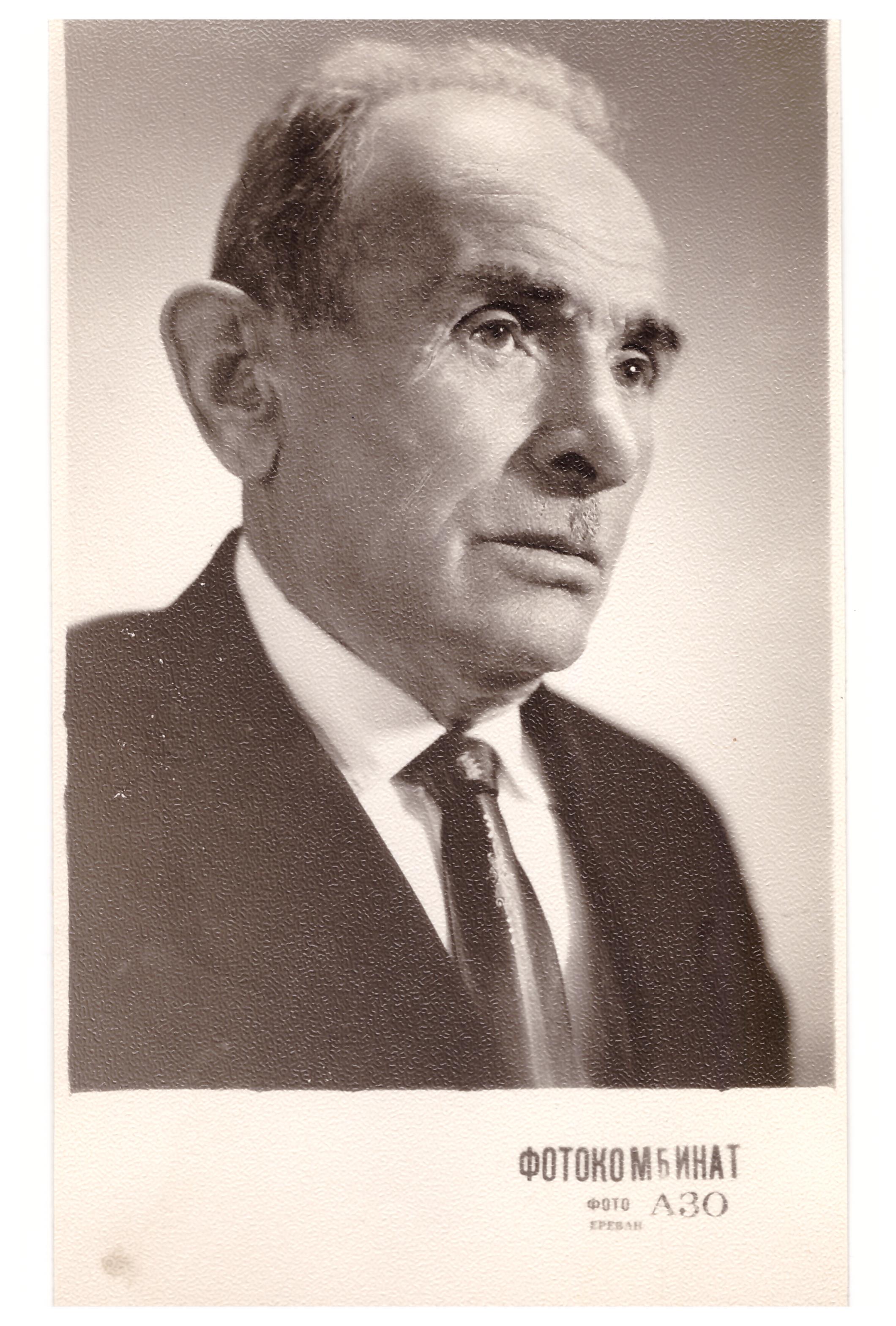 Harutyun Berberyan, whose name and surname I bear, was my Mother’s Grandfather. His story is very tragic and exciting, too. They came from Van, but then they moved to Yozgat village in Ankara. I do not know why their surname changed and became Berberyan, but I have been told, that previously they used to bear the family name Ter-Gabrielyan [Ter is sometimes a form of address for deacons, vicars, etc., tr.] because Grandfather Harutyun and his Grandfather's Grandfather were priests. However, there is one option for the origin of the surname Berberyan. Harutyun’s uncle had some period worked as a barber, which in Turkish is called "berber". Maybe it is from here that the surname Berberyan was created.
Harutyun Berberyan, whose name and surname I bear, was my Mother’s Grandfather. His story is very tragic and exciting, too. They came from Van, but then they moved to Yozgat village in Ankara. I do not know why their surname changed and became Berberyan, but I have been told, that previously they used to bear the family name Ter-Gabrielyan [Ter is sometimes a form of address for deacons, vicars, etc., tr.] because Grandfather Harutyun and his Grandfather's Grandfather were priests. However, there is one option for the origin of the surname Berberyan. Harutyun’s uncle had some period worked as a barber, which in Turkish is called "berber". Maybe it is from here that the surname Berberyan was created.
In his early years Harutyun Berberyan went to
During his studentship, in the years of the Genocide, a Turk (maybe someone, who had definite information), warned Grandfather Harutyun, that massacres would occur. Grandfather Harutyun, managing to avoid military recruitment, hurried to his village Yozgat, to find his brothers and parents and to warn them about the upcoming danger. Of course, he would not have been able to leave Istanbul, if it hadn’t been for the Turks’ help. They prepared fake documents for Grandfather Harutyun, thanks to which he was able to get back to his village.
It is impossible to describe how great Grandfather Harutyun’s pain and disappointment were when he found his village in ruins. There was no one in the village, his family as well. Not knowing what to do, Grandfather Harutyun went to the village next to theirs, where his father's friend was living, hoping that he would find his family there. Reaching that village an awful scene opened in front of him – completely destroyed houses and corps in the streets. Near the pile of the corps of the women, Grandfather Harutyun found a girl (about 12-14 years old), who seemed to be alive.
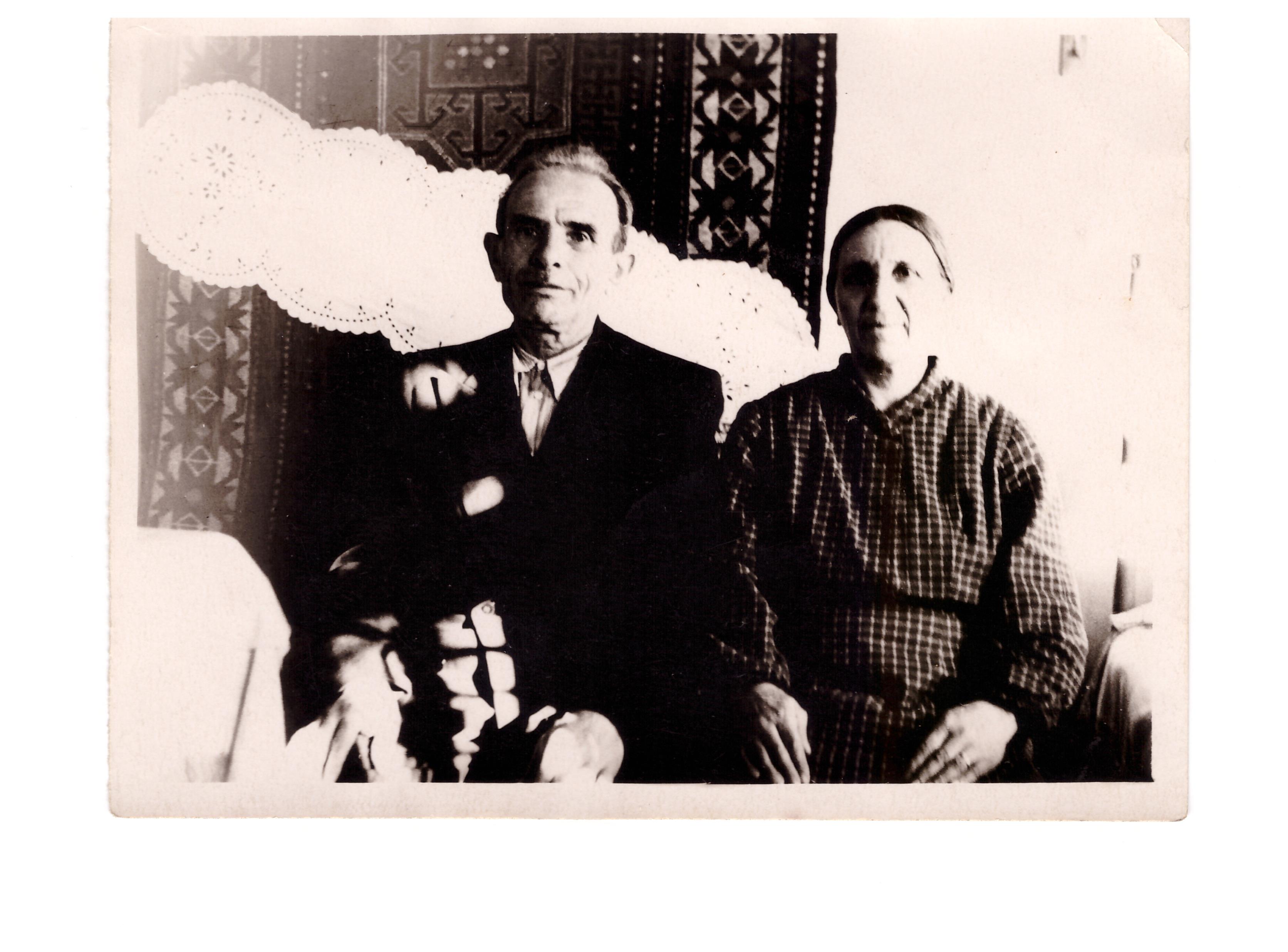 Taking the girl into his hands, Grandfather Harutyun noticed, that she had no wounds and there were no traces of blood. Understanding that the girl had drunk some poison, he took her to a barn, gave her matcun [Armenian yogurt, tr.] to drink and hung her from the skylight and left her until the whole gal and the poison came out from her stomach. Saving that girl’s life, Grandfather Harutyun took the responsibility of taking care of her. Thus, together they went to find my Grandfather’s relatives. On their way Grandfather Harutyun learned that one of his brothers was in Erzurum. Full of expectations my Grandfather and that girl, Mariam, headed for Erzurum, but Grandfather Harutyun's efforts were in vain. It was only after many years, that he found his brother. It turned out that his brother had escaped to Nakhichevan, then from there to
Taking the girl into his hands, Grandfather Harutyun noticed, that she had no wounds and there were no traces of blood. Understanding that the girl had drunk some poison, he took her to a barn, gave her matcun [Armenian yogurt, tr.] to drink and hung her from the skylight and left her until the whole gal and the poison came out from her stomach. Saving that girl’s life, Grandfather Harutyun took the responsibility of taking care of her. Thus, together they went to find my Grandfather’s relatives. On their way Grandfather Harutyun learned that one of his brothers was in Erzurum. Full of expectations my Grandfather and that girl, Mariam, headed for Erzurum, but Grandfather Harutyun's efforts were in vain. It was only after many years, that he found his brother. It turned out that his brother had escaped to Nakhichevan, then from there to
Hopeless, Grandfather Harutyun and Mariam crossed the border and reached Yerevan, and then they went to Vardenis. Several years later, when Mariam grew up, Grandfather Harutyun married her. They had five girls. When I was born, in order to preserve the surname Berberyan and to continue their family’s story, my parents were asked to call me Harutyun and give me the surname Berberyan.
"Mehmed’s Relatives Attempted to Assassinate Him for Marrying my Aunt"
Tells Nubar Chalymyan
My ancestors come from the city of Tigranakert in Western Armenia. They never had any contact with Eastern Armenia. I was born in Iraq. I was 11 when we immigrated to Eastern Armenia. I have no information about my Grandfather’s mother or father as my Father was only 3 when the Genocide of 1915 occurred. He didn’t remember his Father; he had never even seen his picture as bandits had seized all their possessions and one of the bundles with quite many things comprised also their family photos. Only my Aunt (Father’s sister) had seen and remembered my Grandfather and I am going to tell about her. During the Genocide she was a girl of 12-13. I also saw and heard my Grandmother Solomé who had a narrow escape from the Genocide. She was half Armenian and half Assyrian.
The Chalymyans were quite a large dynasty. One part of the dynasty adhered to the Armenian Apostolic Church. Others were Protestants; as we know Evangelical Church also functioned in Tigranakert. Those who adjoined Protestants left Turkey for Europe a year before the Genocide, in 1914. I can’t say whether they felt the danger sooner or not but the fact is that they suffered almost no losses. As to my grandfather and his brothers, they were killed during the events of 1915. Nobody touched them for quite a long time as they were craftsmen and were able to avoid atrocities thanks to their craft.
Naturally, my Father’s family had contacts with the Turks living in Tigranakert and knew the Turkish language perfectly. A Turk called Mehmed, whom I don’t remember, hid my Father’s family during the Genocide. His relatives persecuted that Turk as he had helped "gyavurs". Then he married the eldest of my aunts Azniv Chalymyan although he was 13-14 years older than my Aunt. They got married and decided to leave Tigranakert and settled in Iraq. Mehmed’s relatives, namely his brothers couldn’t reconcile with the idea that their brother had married an Armenian girl and decided to chase and kill him. They came to Iraq secretly and attempted an assassination, but they failed. Mehmed was only wounded.
Mehmed and my Aunt had two children – a boy and a girl. They all had Turkish citizenship. My Aunt’s son knew Armenian perfectly and corresponded with my Father for a very long time. Aunt Azniv died in Turkey where their family had moved before the Iran-Iraqi war. Unfortunately I don’t have that Turk’s photograph that actually saved our family.
"We Had to Bury My Sweet Armenian Mother in the Muslim Way"
Tells Silva Kharchafchyan
I will tell you the story of Shafiká Ramzí. That family was our neighbor in Aleppo and our families were very close. Shafiká had two daughters – Didar (1925) and Ulqyar (1930). Didar taught physics at university, she was a very smart girl. Her sister suffered from some illness and never worked. But she was also smart: sitting at home she graduated from college with high grades.
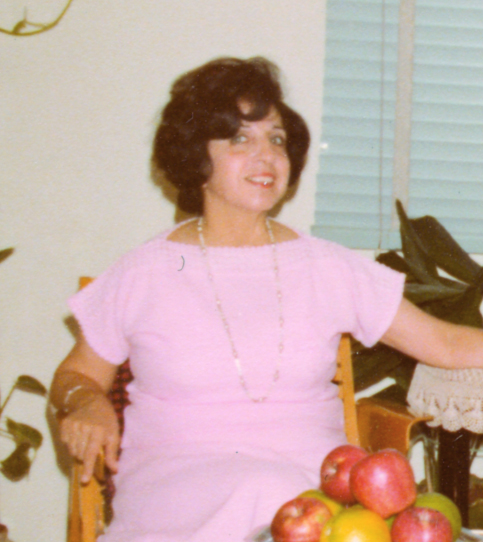 In 1974 our family migrated to Canada. I married and in 1978 came to Aleppo. I went to Shafiká’s place with my husband. I introduced my husband and said, "This is Gevorg – my husband." And Shafiká said in pure Armenian, "Gevorg, do you know I am also Armenian?" This is how I first learnt her talking Armenian. We had been interacting for so many years, yet I had never heard any Armenian from her, I didn’t know her real name was Arusiak.
In 1974 our family migrated to Canada. I married and in 1978 came to Aleppo. I went to Shafiká’s place with my husband. I introduced my husband and said, "This is Gevorg – my husband." And Shafiká said in pure Armenian, "Gevorg, do you know I am also Armenian?" This is how I first learnt her talking Armenian. We had been interacting for so many years, yet I had never heard any Armenian from her, I didn’t know her real name was Arusiak.
In 1999 I visited Aleppo again and learned Arusiak had died. Didar was bitterly crying. I felt there was something that made her unfortunate.
"Didar, what’s the matter?"
"Well, you can’t understand. We had to bury my Mother in the Muslim way. You should have been here and then we could have had a Christian funeral. We don’t know any other Armenians besides you; everybody in my environment is Muslim. We had to have a Muslim funeral for my sweet Armenian Mother."
A little later Didar said, "But, you know, my Turkish father and Turkish grandmother were very nice people and they used to treat my Mom very well."
Then I said, "Please tell me. We have known each other so many years, yet you have never told me your Mother’s story."
And Didar began telling. Her Mother was born in 1911 in Izmir. On August 6-9, 1915 some 4000 Armenians were forcefully deported from Izmir and the Armenian neighborhood was burnt down by Turks.
Their Mother was 4 then. She remained absolutely alone standing on the river bank. Their Father Masud Ramzí was a commander in the army. He was passing by riding his horse and saw the girl and began talking to her. The young girl was able to tell that her mother and two-year-old brother were killed and she was absolutely alone. That man took her to his house and told his mother, "Mother, this child is Armenian. Let us keep it a secret as long as possible."
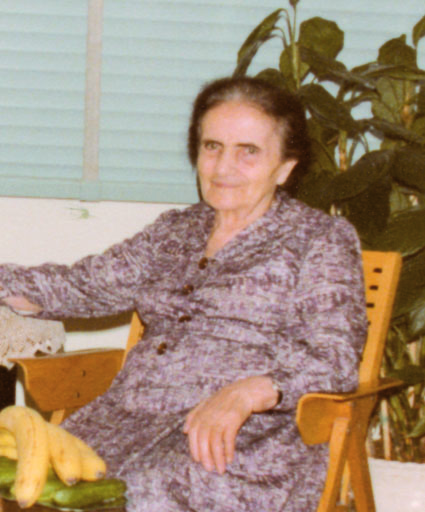 The Turkish mother agreed and changed the girl’s name into "Shafiká" which means "compassion". That Turkish woman knew in whose house there was an Armenian. She visited those house holding the child by the hand, gave food and clothes to the Armenians until they were able to run away. But this girl remained in their house; she was brought up by them. That Turkish commander was married and had children. When Shafiká was already 14-15 years old he told his mother, "What are we going to do with this girl? Instead of marrying her to another Turk let me marry her. She has grown up in our home, she was brought up by us."
The Turkish mother agreed and changed the girl’s name into "Shafiká" which means "compassion". That Turkish woman knew in whose house there was an Armenian. She visited those house holding the child by the hand, gave food and clothes to the Armenians until they were able to run away. But this girl remained in their house; she was brought up by them. That Turkish commander was married and had children. When Shafiká was already 14-15 years old he told his mother, "What are we going to do with this girl? Instead of marrying her to another Turk let me marry her. She has grown up in our home, she was brought up by us."
Well, according to Muslim tradition a man can have a second wife. So they got married.
Some time later the news spread around Izmir that this man Masud lived with an Armenian, that he had married an Armenian. Not to cause any problems for the family, he took them and moved to Aleppo. His first family remained in Izmir.
In 1930 their second daughter was born in Aleppo. She was 2-3 when their father died. He had worked as a teacher in Aleppo. When Masud died Arusiak was at a loss not knowing what to do. She took her children and went to an Armenian orphanage. The children were admitted there and Arusiak was hired to work as a housepeeper. My Grandmother was also a housekeeper there and they became friends. This is where our friendship started. Arusiak could understand Armenian very well.
Those girls were neither Islam, nor Turks. They greatly respected their mother but went neither to church nor to mosque. When we invited them to our events – Christening, wedding, they would always come. They never got married. Perhaps they had some psychological problems…
My Grandfather often Woke up and Cried at Nights Remembering His Brother’s Cruel Murder
Tells Susanna Manukyan
During the Genocide years my Grandfather, Armenak Mkrtchyan, together with his family lived in Sehrvanshekh village. He was an educated man and knew three foreign languages – English, Turkish and Kurdish. He worked in the village school, where he taught the Armenian language and literature to the pupils.
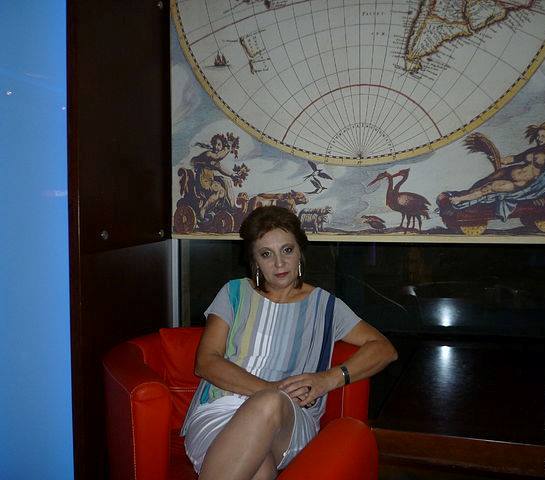 During the 1915 massacres Turks invaded villages separating women, men and children and expelling them in different directions. My Grandfather, realizing very well that on the roads of exile Turks would kill Armenian men, decided, as he often said "instead of going to the slaughterhouse like a sheep", to take his brother, Knyaz Mkrtchyan, who was ill with typhoid and was residing in the same village, and run to the neighboring village Simon to find shelter in the house of his Turkish friend - a Osman Agha.
During the 1915 massacres Turks invaded villages separating women, men and children and expelling them in different directions. My Grandfather, realizing very well that on the roads of exile Turks would kill Armenian men, decided, as he often said "instead of going to the slaughterhouse like a sheep", to take his brother, Knyaz Mkrtchyan, who was ill with typhoid and was residing in the same village, and run to the neighboring village Simon to find shelter in the house of his Turkish friend - a Osman Agha.
In spite of great difficulties they managed to reach and find shelter in the house of their Turkish friend. Due to the care of Osman Agha and his family my Grandfather’s brother soon managed to overcome his illness. My Grandfather told that Turks often came and searched houses of the Turks in the village as they knew that local Turks being in good relations with Armenians often hid them in their places trying to save them from the Genocide organized against Armenians.
One day, when Turks as usual came to search the house of Osman Agha, my Grandfather and his brother hid themselves in the barn. After the Turks found them, Osman Agha stood in the middle of the door and tried to prevent the Turks from taking my Grandfather and his brother with them. When the Turks in the end managed to take my Grandfather’s brother, Knyaz, Osman Agha followed the Turks, who were taking twelve Armenians to the slaughterhouse, begging to spare Knyaz’s life. He even turned to the method, which usually worked with Turkish officials, offering them a bribe. However the Turks stayed irresistible threatening to kill him as well if he continued persisting.
Thus my Grandfather witnessed how the Turks executed his brother and eleven more Armenians shooting them by the river Khnus. I remember my Grandfather often waking up and crying at nights. When we asked him what the cause of his grief was, he replied that he remembered cruel murder of his brother.
During the Genocide my Grandfather not only lost his brother but also his parents, who died of typhoid. He lost also his eight months’ old daughter, who died not being able to stand the hardships of the exile.
Fortunately, Osman Agha’s family helped my Grandfather to escape to Armenia. In Armenia my Grandfather found his wife – my grandmother Siranuysh Mkrtchyan. They continued to live together and had seven children. Thus, in spite of experienced hardships, my Grandfather in the end made true his mother’s commandment: "My son, sit around a table with seven sons."
"Mother, Mother Wake up, We Need to Work, Don’t We?" My Mother Simply Did Not Believe that Grandmother Would Never Wake up Again
Tells Sona Chalgushyan
My Grandmother, Lusya Hovhannisyan continued to live in Adana, at her father’s place with her two-year-old daughter – Haykanush (my mother), and at that time still not born son – Napoleon after her husband left for war.
My Great Grandfather was a rich man and enjoyed the respect of his Turkish plebeians. My Mother often mentions that if her father had paid attention to the warnings of his Turkish plebeians that a conspiracy was being planned against the Armenians by the Turkish government everything might have had a better ending.
After the Armenian massacres had been planned in Adana, the Turks gathered all the Armenian males, who could wear weapons, irrespective of their age, and isolated them in a stud. My Mother remembers how one day her Grandfather took her in his arms and said that they were allowed to visit her uncles in the stud. After they took some sweets and visited them, my mother never again saw her uncles. The next day the Turks set the stud to fire.
One day my Grandmother, to earn some money, decided to gather a group of Armenian women and go to take part in the railroad construction work organized by the Turks. Most Armenian women, after the Turks had got rid of almost all Armenian men, had no choice but do hard jobs for Turks like cutting stones.
Soon the job demanded that my Grandmother go even farther from her house in Adana, and she decided to take the children with her. But one day, hoping that her husband would return from war and look for his family, my Grandmother decided to go back. Her working group, which consisted of only women and children, also decided to go back because they trusted my Grandmother and were unwilling to leave her. It is interesting to mention that among the children in the working group there were also boys, whose hair their mothers didn’t cut because of the fear that the Turks would kill them as well.
On their way back a Turkish mob attacked the group and killed all of them. My mother remembers how a Turk put a weapon to her brother’s heart and tried to shoot. Fortunately, the weapon did not shoot and the child managed to run away. My mother, who at that time was only six years old, managed to survive miraculously – she lay motionless beside her dead mother. After the Turks had gone away she called her mother: "Mother, mother wake up, we need to work, don’t we?" My mother simply did not believe that Grandmother Lusya would never wake up again.
Fortunately at that time a brigade of Armenian volunteer fighters, among whom was also a son of my Mother’s uncle, Davit Tujaryan, was passing by. They buried all the dead and took with them the children who had managed to stay alive.
Uncle David, realizing that it was not safe to take the children with him, gave them to his Turkish friend, who swore in blood, to save the children from the criminals and take to an orphanage. My Mother tells that Uncle David’s Turkish friend treated them very well: he did not eat instead gave bread to them. He managed to take the children across the border and hand them to the French, who took them to the orphanage. Thus my Mother and Uncle managed to survive the Genocide miraculously…
"Turks Helped the Family of My Grandmother’s Father to Get to The Border of Eastern Armenia"
Tells Margarita Mkrtchyan
I am Margarita Mkrtchyan and I have heard this story from my Grandmother. Her reminiscences about the Genocide are based on stories told by her Mother Gyulizar and paternal grandmother Aghavní.
My Grand-grandmother was born in 1908 in the village of Artamet, Van. Their family was large and quite wealthy.
A thought followed her all her life, "We should go back to our native village and return all that belonged to us."
Our Grand-grandmother Gyulizar was one of those rare people surviving the Genocide who, to relieve her pain, often told about their village and about everything they left there. She also told about the hardships her family, her relatives had undergone…
And my Grand-grand-grandmother Aghavní always remembered with sorrow how during the years of massacres, as if a meeting was to be held to save the Armenians, some 137 Armenians were brought together and burnt alive… None of them was able to survive.
That was followed by Armenians’ elemental banishment during which Armenian families were separated, many family members got lost forever.
Gyulizar also lost her family, but fortunately she managed to get to Eastern Armenia. Here she found herself in an American orphanage and began inquiring about her relatives. She was able to find out that her brother Afon had also been to that very orphanage but when she tried to find him she learned that Americans had taken the children to some foreign country. She never heard from her brother.
One of the employees at the orphanage was Tatul Altunyan’s sister Shushanik who had some liking for Gyulizar. And it was her that some years later advised my Grand-grandfather’s family to take Gyulizar as a wife for their son.
The family of my Grandmother’s father had also migrated from the same village Artamet, Van.
Grandmother told that unlike Gyulizar they avoided talking about the calamities of the Genocide. However, while talking about the years of carnage they told about cases when some Turks and Kurds helped Armenians. They had also got to Eastern Armenia with the help of Turks. Turks had helped Agavní’s husband to get his family and their gold hidden in blankets to the border. Although the family of Grandmother’s father was able to reach Eastern Armenia safely, my Grandmother’s grandfather – Aghavní’s husband – soon had a heart stroke and died because of the sorrow of losing his native home.
Grandmother Aghavní also told about a case when a Turkish neighbor, in order to save an Armenian girl, dressed her in Turkish clothes and hid her in his house until it became convenient to take her across the border and send to Eastern Armenia. Grandmother Aghavní used to tell about how they were made to leave their native village. Apple gardens of Artamet the village was famous for, the unique scent of the apples always remained in her memories.
Grandmother Aghavní was in essence a simple woman. She lived 127 years. During all her life she also dreamt of going back to their native village. Once she asked a relative, "How much red money should I give to be taken to my village to get back my dried fruit?"
"In One Day My Great Grandfather’s Family Lost Everything"
Tells Davit Avetisyan
This story was told by my Grandmother, Tereza Nalbandyan, about her Grandfather. When she was telling me this story, I was listening to her very attentively and was feeling sad. Now, my emotions are different. Every time I tell this story, I tremble with my whole body, as if I were present there and saw that disaster – the Genocide, with my own eyes.
 My Great Grandfather, Martiros Abajyan, was from the family of intelligentsia. He was born and grew in the city of Kars. He was married and had 6 children. In Kars my Great Grandfather was the editor of "The Mshak" newspaper. He was a very joyful and kind person. Everyone liked him.
My Great Grandfather, Martiros Abajyan, was from the family of intelligentsia. He was born and grew in the city of Kars. He was married and had 6 children. In Kars my Great Grandfather was the editor of "The Mshak" newspaper. He was a very joyful and kind person. Everyone liked him.
It was 1915… A Turkish woman called Gyulizar lived next to my Great Grandfather. She was a Turkish Pasha’s sister. One day, she happened to overhear her brother saying that Armenians were going to be massacred that night. Gyulizar hurried to the Abajyans, whom she respected very much, to warn them about this. My Great Grandfather in his turn warned anyone he could. Fearing that he would not be able to protect his family and his relatives from the Turks, he offered them to run away. They were very rich and had a lot of gold, which they kept in jars inside the walls of the house. However, the desire to survive and to live was greater. Thus, without losing any time, Grandfather Martiros left everything they had, took his family and his relatives and set out.
On their way they witnessed an awful scene. The streets were full of corps of children and adults. Awestruck, they were going ahead, not knowing what was waiting for them. At that time my Grandmother’s mother and father were already married, and my Grandmother’s elder sister and brother were born. On their way my grandmother’s mother tied the children with rope to each other – one on her back and the other on her chest, so as they did not lose each other. However, on their way, in that turmoil, both kids got lost and no one was able to find them. Only after several years it became possible to find out, that some Americans had found them and had taken with them to America.
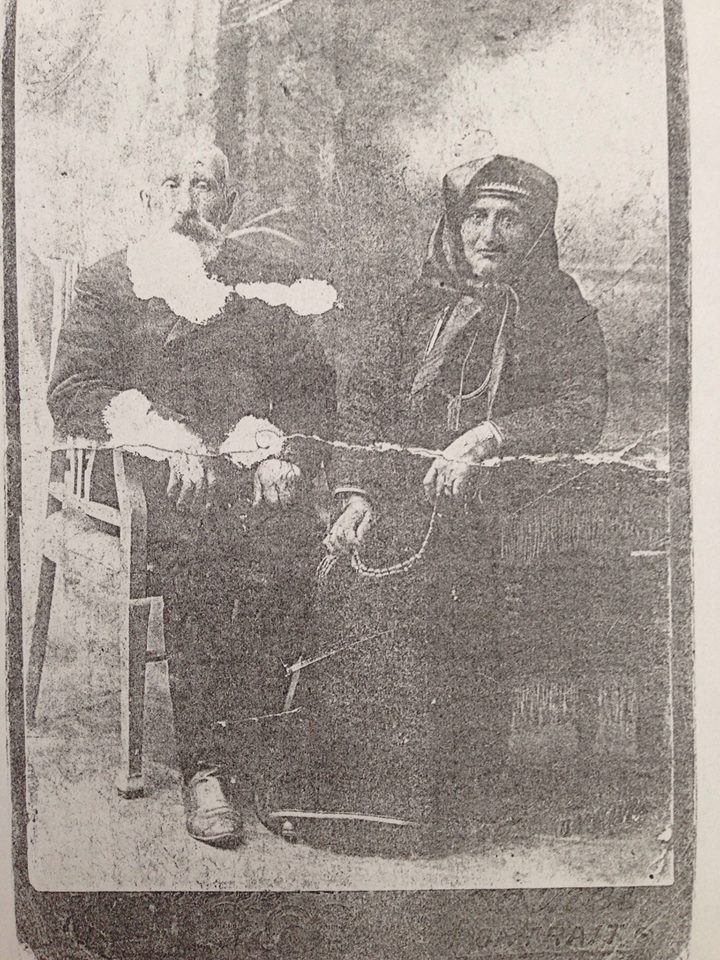 Thus, after several hours of walk they found themselves surrounded by Turks. Grandfather Martiros and his family did not know what to do. If they went right, they would be drawn in the river, if they went left, they would be killed by Turks. Not knowing what to do, Grandfather Martiros stood on his knees in panic and begged the Turks to take everything they had, but not to touch his children. The Turkish soldiers’ answer was the following: "No, everyone is going to die".
Thus, after several hours of walk they found themselves surrounded by Turks. Grandfather Martiros and his family did not know what to do. If they went right, they would be drawn in the river, if they went left, they would be killed by Turks. Not knowing what to do, Grandfather Martiros stood on his knees in panic and begged the Turks to take everything they had, but not to touch his children. The Turkish soldiers’ answer was the following: "No, everyone is going to die".
At that moment, when one of the Turks raised his sword to decapitate Martisros, their neighbor Gyulizar appeared God knows from where, who, probably, realizing that the Abajyan family would not be able to run away safely, had hurried up for help. She stood in front of the Turk soldiers, took off her headscarf and threw it to the ground, in front of the soldiers. The Turks recognized her. Gyulizar ordered the soldiers not to touch the Armenians standing there and to give them a way to pass. The Turkish soldiers put their swords down and Grandfather Martiros and his family passed. Thus, due to this Turkish woman Abajyan Martiros' family was saved from the Turkish sword. They walked 4 days and 4 nights until they came to
This is my story and every time I tell it I really feel the horror that the Abajyans experienced in those years. They had everything and lost everything in one day – their house, property, friends and relatives. It is awful just to think about it…
My Grandfather’s Two Brothers and Parents Were Killed During the Massacres
Tells Lusine Mardeyan
My Grandfather, Mukhan Mardeyan, the son of Khachatur, was born in 1902. In the year of 1915 he lived in Ghznchaghchagh village of Kars region. Turks killed his two brothers and parents during the massacres. His elder brother, Aghasi, managed to escape from the village and leave for Armenia. During the massacres the family members, who managed to survive, departed escaping in different directions.
After losing the connection with his family members, my Grandfather had to stay and work as a shepherd in the house of a Birdan Aghi pasha. It is worth mentioning, that my Grandfather’s family and the family of Birdan Aghi pasha were in good relations before the massacres. Birdan Aghi persuaded my Grandfather to stay in their house because he considered him to be a good shepherd. Birdan Aghi pasha promised not to harm him claiming that in contrast to the Turkish government, his family had nothing against the Armenians. Thus they kept my Grandfather in their family without revealing his being an Armenian.
Unlike their father, the sons of Birdan Aghi pasha did not want my Grandfather to stay in their place, just because he was an Armenian. They often plotted against my Grandfather- stole and killed their own sheep later on putting the blame on him. They treated my Grandfather as an enemy. He often witnessed how they were praising themselves in the presence of their father for killing an Armenian or harming an Armenian family.
After living in Birdan Aghi pasha’s house for ten years, once my Grandfather heard a conversation, during which the family members were discussing how to behead him for betraying their confidence and stealing their sheep. After that incident my Grandfather was in a real confusion and did not know what to do. At that time Birdan Aghi’s mother, who was a kind woman, advised him to run away showing the way to Armenia.
Having no other choice my Grandfather decided to run away. On his way to Armenia, my Grandfather came across a group of Turkish men, who were sitting around a fire. It is interesting to notice that although they realized that he was an Armenian, they did not harm him. On the contrary they helped him and accompanied him half his way.
Unfortunately, my Grandfather’s trip to Armenia was not so easy. Having covered half his way he noticed horsemen following him. Fortunately, he managed to hide himself in a cave and stay there for a few days. Birdan Aghi pasha’s mother was so generous that not only helped my Grandfather to run away but also provided him with food knowing that he had several days’ trip to pass. Thanks to her my Grandfather managed to survive in that cave for several days.
Thus, the Turks, who followed my Grandfather did not manage to find him and came to the conclusion that he had managed to cross the border and escape to Armenia. My Grandfather came to Armenia, found his elder brother, who resided in Bajoghli (present day Haykavan) village and in this way managed to survive the massacres.
Other materials on this subject
- FM of Luxembourg Visited Armenian Genocide Memorial Asselborn has arrived in Armenia for an official visit at the invitation of Armenian Foreign Minister Edward Nalbandian. He will have meetings with Armenia’s President Serzh Sargsyan and will visit the...
- An Armenian Living in Turkey: The Events of 1915 Cannot Be Forgotten What refers to the future, then I hope that the Armenians and Turks will reconcile in the end. The problem is between the governments and they must resolve it
- Armenian Living in Turkey: Advocacy for Brotherhood Should Be Done at the State Level to Sound More Convincing The country already has problems connected with human rights and freedom of expression, which for Armenians are doubled.
- French Senate Will Discuss Bill Criminalizing Armenian Genocide Denial in Early October "We work in order the required number of MPs to vote for the bill. You know the Turks are not indifferent, they also work, do everything in order that option not to be adopted."
- Genocide Education Bill in the US State Michigan Signed into Law "I am elated we finally accomplished making this important genocide educational program into Michigan law," Jamian said. "This success demonstrates that when our community leaders all work together we...
-
 17:08
17:08The regular session of the Anti-corruption Policy Council takes place in Jermuk
-
 15:05
15:05The Prime Minister sends congratulatory messages to the supreme leader of Iran and the President of Iran
-
 11:11
11:11Armenia sends earthquake aid to Turkey
-
 10:43
10:43Commemoration of the Pontiff St. Sahak Partev
-
 09:16
09:16Some roads are closed and difficult to pass in Armenia
-
 19:55
19:55Phone conversation of the Foreign Minister of Armenia with the U.S. Assistant Secretary of State for European and Eurasian Affairs
-
 18:30
18:30Prime Minister Pashinyan and President Khachaturyan meet
-
 18:20
18:20Ararat Mirzoyan with Co-Chairman of the OSCE Minsk Group of France Brice Roquefeuil
-
 17:01
17:01Humans could land on Mars within 10 years, Musk predicts
-
 16:45
16:45France, US urge 'immediate' end to Nagorno Karabakh blockade
-
 16:01
16:01Blockaded Nagorno Karabakh launches fundraiser to support quake-hit Syria
-
 15:59
15:59Earthquake death toll in Turkey rises to 18,342
-
 15:43
15:43Ararat Mirzoyan Held a Telephone Conversation with Sergey Lavrov
-
 15:06
15:06French president rules out fighter jet supplies to Ukraine in near future
-
 14:47
14:475 Day Weather Forecast in Armenia
-
 14:44
14:44President Vahagn Khachaturyan wrote a note in the book of condolences opened in the Embassy of Syria in Armenia
-
 14:20
14:20Azerbaijan’s provocations impede establishment of peace and stability – Armenian FM tells Russian Co-Chair of OSCE MG
-
 12:57
12:57France representation to OSCE: Paris calls on Azerbaijan to restore freedom of movement through Lachin corridor
-
 11:40
11:40Command of Kosovo forces highly appreciated preparation of Armenian peacekeepers
-
 10:16
10:16The United States withdrew from sanctions against Syria for six months the provision of assistance after the earthquake
day
week
month
Humidity: %
Wind: km/h

